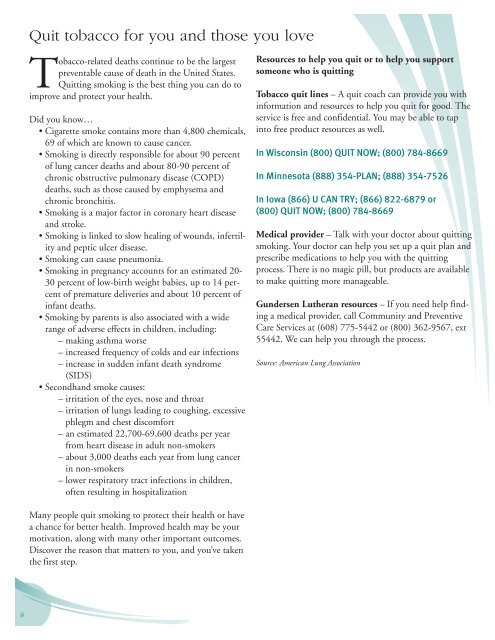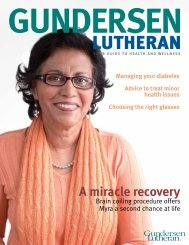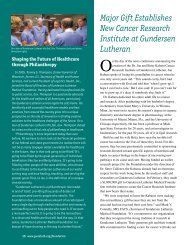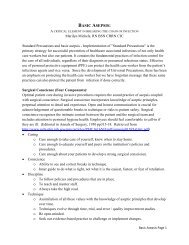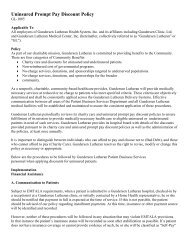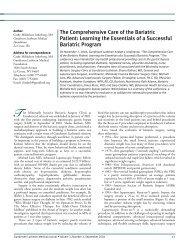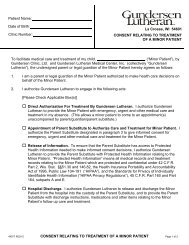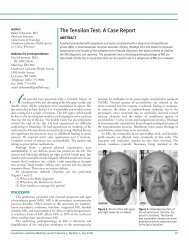Prevention Connection - Gundersen Health System
Prevention Connection - Gundersen Health System
Prevention Connection - Gundersen Health System
You also want an ePaper? Increase the reach of your titles
YUMPU automatically turns print PDFs into web optimized ePapers that Google loves.
Quit tobacco for you and those you love<br />
Tobacco-related deaths continue to be the largest<br />
preventable cause of death in the United States.<br />
Quitting smoking is the best thing you can do to<br />
improve and protect your health.<br />
Did you know…<br />
• Cigarette smoke contains more than 4,800 chemicals,<br />
69 of which are known to cause cancer.<br />
• Smoking is directly responsible for about 90 percent<br />
of lung cancer deaths and about 80-90 percent of<br />
chronic obstructive pulmonary disease (COPD)<br />
deaths, such as those caused by emphysema and<br />
chronic bronchitis.<br />
• Smoking is a major factor in coronary heart disease<br />
and stroke.<br />
• Smoking is linked to slow healing of wounds, infertility<br />
and peptic ulcer disease.<br />
• Smoking can cause pneumonia.<br />
• Smoking in pregnancy accounts for an estimated 20-<br />
30 percent of low-birth weight babies, up to 14 percent<br />
of premature deliveries and about 10 percent of<br />
infant deaths.<br />
• Smoking by parents is also associated with a wide<br />
range of adverse effects in children, including:<br />
– making asthma worse<br />
– increased frequency of colds and ear infections<br />
– increase in sudden infant death syndrome<br />
(SIDS)<br />
• Secondhand smoke causes:<br />
– irritation of the eyes, nose and throat<br />
– irritation of lungs leading to coughing, excessive<br />
phlegm and chest discomfort<br />
– an estimated 22,700-69,600 deaths per year<br />
from heart disease in adult non-smokers<br />
– about 3,000 deaths each year from lung cancer<br />
in non-smokers<br />
– lower respiratory tract infections in children,<br />
often resulting in hospitalization<br />
Resources to help you quit or to help you support<br />
someone who is quitting<br />
Tobacco quit lines – A quit coach can provide you with<br />
information and resources to help you quit for good. The<br />
service is free and confidential. You may be able to tap<br />
into free product resources as well.<br />
In Wisconsin (800) QUIT NOW; (800) 784-8669<br />
In Minnesota (888) 354-PLAN; (888) 354-7526<br />
In Iowa (866) U CAN TRY; (866) 822-6879 or<br />
(800) QUIT NOW; (800) 784-8669<br />
Medical provider – Talk with your doctor about quitting<br />
smoking. Your doctor can help you set up a quit plan and<br />
prescribe medications to help you with the quitting<br />
process. There is no magic pill, but products are available<br />
to make quitting more manageable.<br />
<strong>Gundersen</strong> Lutheran resources – If you need help finding<br />
a medical provider, call Community and Preventive<br />
Care Services at (608) 775-5442 or (800) 362-9567, ext<br />
55442. We can help you through the process.<br />
Source: American Lung Association<br />
Many people quit smoking to protect their health or have<br />
a chance for better health. Improved health may be your<br />
motivation, along with many other important outcomes.<br />
Discover the reason that matters to you, and you’ve taken<br />
the first step.<br />
6


